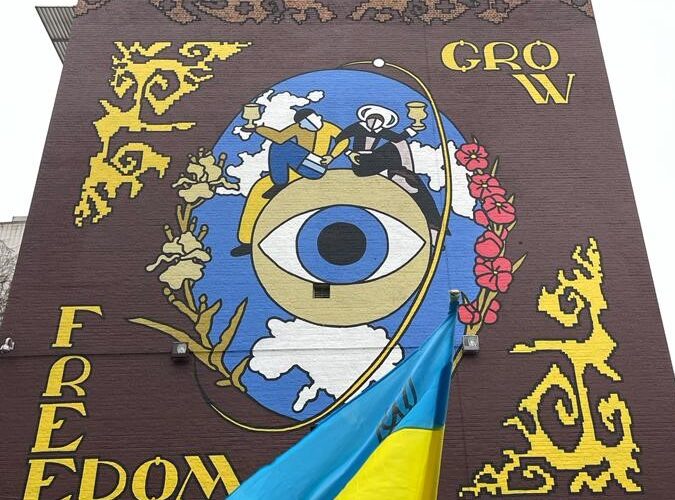
We are 30 individuals in a comfortable room with plenty of light, hosted by a wealthy foundation pertaining to a large Austrian bank. Half of the participants come from a country at war, Ukraine; Ukrainians who may have lost relatives suffered trauma and pain or were displaced from occupied territories by the Russian aggressor, busy with managing food distribution or dealing with the fallout of bombing or mass murders. Most are women because men cannot leave the territory or are fighting.
We exchange about matters of cultural policy!
The aim is to help rebuild Ukraine and prepare for its EU integration. The ambition is to make concrete proposals to Ukrainian authorities by mixing experience on the ground (entrepreneurs, academics, civil servants, policymakers from Ukraine) and expertise in cultural policy and management embodied by experts from the rest of Europe.
In truth, we are 30 humans affected to different degrees by a war threatening the values cultural workers hold as fundamental: freedom of expression, justice, freedom of thought, respect for memory, diversity and heritage, revulsed by injustice, violence, or the abuse of power.
The formidable and talented Yana Barinova is masterminding the Policy Lab series. She launched the initiative soon after the full-scale invasion started in February 2022, when she was able to extract her daughter from Kyiv. Yana is originally from Odessa. As a former trainee at KEA and after a successful collaboration on the Babyn Yar memorial, we wanted to help Yana settle in her new life and assist her in giving evidence that culture policy is essential in the process of Ukraine’s EU integration. Her work on culture will enable the required mind shift to modernise institutions, implement new processes to build trust in public policies and social cohesion as well as deal with a post-soviet culture that is clogging mentality and the implementation of the rule of law. Policy Lab workshops serve as a powerful reminder of the transformative potential of cultural policy and the impact it can have on a country’s recovery and future.
KEA had meaningful working experiences in Ukraine dating back to 2017 with 5 different missions as the expert to the Council of Europe and the European Union, providing technical assistance to the Ministry of Culture. Despite a challenging working environment characterized by low pay, desperate processes, and few rewards, all characteristics of bureaucratic systems inherited from the Soviet time, we felt the energy and resolve to transform institutions and decision-making processes.
This was our second Policy Lab (April 2023). This time we considered the role of culture in building social resilience and absorbing adversity. Something must be working: we saw more of Boris Marte, the Erste Foundation’s Chairman, and the professional video crew working non-stop to document testimonies and outcomes of the workshop. Even more tangible, a former EU ambassador in Kyiv attributed his constant references to “culture as a necessary tool for transformation” to his participation in the first Policy Lab. Similarly, the new Ukrainian cultural heritage law has been amended by a provision directly stemming from the exchange that involved the Deputy Minister of Culture.
Participants are happy and grateful for a moment of exchange that justifies a long journey from a country difficult to leave or access because of flight bans. The urgency of war does not permit participants to waste time and energy in a talking shop. We contributed to building trust and bonds, human fraternity, and friendship. This makes us happy. Participants will soon receive the policy paper that lists co-created practical recommendations for the Ukrainian Ministry of Culture, a key partner of the Policy Lab.
The Policy Lab gives meaning to our work. It shows that working for culture remains useful even during war and existential threats. Culture is a primary reason for wars to take place. Culture is also the necessary agent to transform people and society to rebuild on more solid ground than terror, destructive ideologies, injustice, or economic dependency.
As a policy issue, culture is primarily handled by women. The Policy Lab is the opportunity to meet extraordinary women from Ukraine whose courage and focused sternness are exemplary. I will never forget the formidable and moving interventions of Mikhailyna Shoryk-Shkarivska, the Deputy Major of Bucha, or Elmira Ablyalimova, the representative of the Crimean Tatars. The Policy Lab initiative will continue to provide a platform for people to share their expertise and make a positive impact.
Culture will not win the war. Tanks and missiles are more effective. It remains that culture serves as a powerful reason to fight. A country cannot be built without common values, memories, narrative, language, shared emotions and joyful experiences, imagination, and pride rooted in the geography and history of a territory. The war will help define Ukraine’s contribution to the world of culture, adding another layer of diversity. At its best culture and cultural workers will help develop the national fiction nourishing the required cohesion for the building of a common destiny.
Maybe we contributed to this.
Philippe Kern
21.04.2023